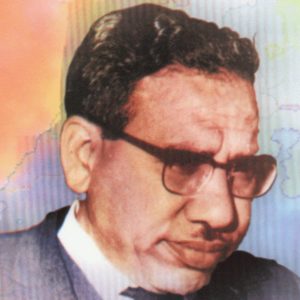Ali Ahmed Bakathir
عَلِي أَحْمَد بَاكَثِيْر

Ali Ahmed Bakatheer عَلِي أَحْمَد بَاكَثِيْر
Born in Surabaya Indonesia in 1910, Ali Ahmed Bakathir is a renowned and highly regarded Arab literary figure and playwright. As was the case with many Yemeni fathers in southeast Asia at the time, namely Indonesia and Malaysia, his father decided that the family go back to their homeland—Say’un سَيْئون city in Hadhramautحَضْرَمُوت —so that Ali could acquire Arabic natively and learn the culture and values of his own people. He was ten years of age at the time.
Bakathir received his early education in Say’un and Saudi Arabia. His skill in literary writing began around the age of twenty. He founded a magazine called al-Tahdheeb ‘good manners.’ Besides poetry, he wrote articles that criticized customs and habits, and called for granting the woman her rights. Owing to his daring and blunt criticism, his magazine was suspended by the authorities. Therefore, he moved to Aden which was more vibrant, by the measures of the period, and had considerable freedom of expressions.
Moving to Aden was quite a turning point for Bakathir. He made acquaintances and friends with educated people, writers, and literary personalities, like Ali Mohammed Lugman, Omar Mahayriz, Mohammed Abdu Ghanim, among others. They welcomed him to their literary clubs and gatherings and gave him the opportunity to present his views and recite his poems, which were called the Adaniyat العَدَنِيَّات. From Aden, he moved to nearby Somalia and Ethiopia, and subsequently to Saudi Arabia where he wrote his first poetic play entitled Humam in the Capital of Ahqaf. In this play, he delineates the miserable situation of his community including backwardness and ignorance, bribery, and other social dated practices.
Bakathir moved to Egypt in 1934 to continue his education. He obtained a Bachelor of Arts in English literature and diploma in education. Following his graduation, he worked for the ministry of education as a teacher for around fifteen years. During this time, he became an Egyptian citizen. Thereafter, he was an officer in the ministry of culture and national guidance, Egypt.
In his literary works, particularly his plays, Bakathir was inspired by history, heritage, and contemporary life. Therefore, most of his plays were converted into theatrical productions that were far more poplar than the works of his contemporaries, such as Tawfiq al-Hakim. His works were marked by the touch of life, the highness of soul, the highbrow writing style. The focus of these works was three-fold: time, death, and love.
As for his literary achievements, Bakathir authored more than fifty books most of which were plays. Also, he was a member of poetry and story committee in the higher council for arts and literature. Being a story writer, he was a member in the story club in Egypt. One his most renowned works is a three-part historical play that delineates the life of the third caliph—Umar ben al-Khattab.
Bakathir’s literary contributions were highly honored and appreciated. He was awarded many prizes and badges of honor. In 1962, he was awarded the national prize for arts and literature. President Jamal Abdel Nasser bestowed upon him the badge of honor for science and arts. Also, he was awarded the badge of honor for the Day of Knowledge in 1963.
Despite his great literacy achievements and contributions, Bakathir was criticized for his excessive enthusiasm and chauvinistic views about Arabs and Arabism. This was clear in these two poetry lines:
ثَمَانُونَ مَلْيُون يُبَاهُون كُلُّهم **** بِخَيْرِ لُغَاتِ الأَرْضِ والكُلُّ شَاهِدُ
أَلا كُلُّ شَيءٍ مَا خَلا اللهُ بَاطِلُ **** أَلا كُلُّ شَيءٍ مَا خلا العَرَبُ بَائِدُ
‘Eighty million people are highly proud of the most beautiful language on earth (i.e. Arabic), and everyone is a witness. Certainly, everything on earth is of no avail except Allah. Certainly, everything on earth will become extinct except Arabs.’